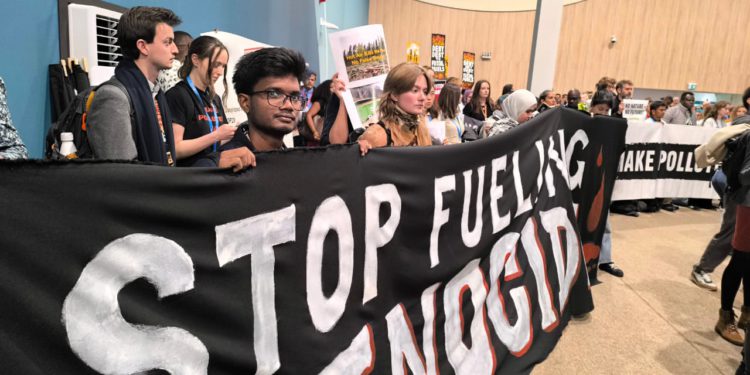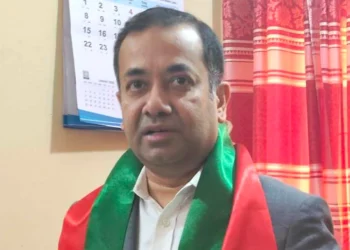Md Hasanur Rahman Tanzir – Countries affected by adverse climate impacts have not received money as promised in previous days.
Despite this, the affected countries in this year’s COP-29 held in Baku, the capital of Azerbaijan, have demanded a compensation of one trillion dollars a year. Although the heads of government of influential countries such as the United States, China, and India did not participate in the conference, they are in doubt about getting this huge amount of money. The LDC leaders raised this demand in the COP29 conference (Conference of the Parties). Meanwhile, the business leaders, banks and owners of multinational companies who participated in the conference have shown interest in investing 10 trillion dollars in green industry to combat the effects of climate.
On the other hand, in an event on the sidelines of the conference, World Bank’s Global Leader of Carbon Market, Climate Finance and Economics Chandra Shekhar Sinha said in a discussion, Bangladesh has a potential market of about 1 billion in annual income from the carbon market.
The issue of this possibility was discussed by the negotiators in the discussion entitled “Bangladesh Journey in Article 6: Pioneering Carbon Market Opportunities” at the Bangladesh Pavilion of the Infrastructure Development Company Limited (IDCOL) COP-29 on Sunday.
comes up in speech. World Bank’s Carbon Market, Climate Finance and Economics Global Leader Chandra Shekhar Sinha said in a discussion, Bangladesh has a potential market of about 1 billion in annual income from the carbon market. Alamgir Morshed, Executive Director and Chief Executive Officer of Idcall moderated the discussion. He said that Edcall has reported that the company has implemented projects worth US 1.60 billion so far. We have been approved to implement projects worth US 2.6 billion.
As the policy has been shifted from Article 6 to Article 6, we have not yet been able to implement the EES 1 billion projects. In the discussion, the head of the renewable energy department of Edcol. Enamul Karim Pavel said, Bangladesh has a carbon trading potential of 1:0 to 1.5 billion dollars.
Another carbon trading expert Shyamal Burman echoed this and said the market price could rise to $20 to $30 per tonne. he said By 2030, Bangladesh has the potential to trade 40 million tons of carbon annually. But it is not possible for Bangladesh alone. International support is needed. Deputy Director of Environment Department. Harun Or Rashid said Bangladesh has already drawn up a list of steps to be taken over the next three years to fill the gaps identified in meeting the Article 6 requirements for potential carbon market entry and to achieve 40 credits. million tons of carbon. Secretary of the Ministry of Environment, Forest and Climate Change was the chief guest of the meeting. Farhina Ahmed. Speaking at the discussion, the MOEFCC Secretary emphasized that the Bangladeshi private sector is green,
Forestry should also be considered as forest because the country is a land-scarce. MOEFCC Secretary said that every person can benefit from carbon trading if they have proper knowledge and information about the carbon market. This knowledge is very important, he added, adding that all citizens and the private sector should be aware and knowledgeable about what the carbon market is. He expressed hope that Bangladesh will move forward with skills and knowledge to take advantage of the global carbon market. MOEFCC will provide all-out support to the private sector to achieve success in carbon trading, he assured, adding that we have a plan to create an environment where every individual has a low carbon footprint through conservation and protective environment. Our role will be highly transparent and accountable for approval of carbon certificates. The value of the global carbon market will reach a record high of 881 billion euros (949 billion US dollars) in 2023. Carbon trading is the buying and selling of credits that allow a company or other entity to emit a certain amount of carbon dioxide or other greenhouse gases. Carbon trading is also referred to as carbon emissions trading. After much discussion, a global carbon market was established at the Glasgow COP-26 Climate Change Conference, establishing the first globally unified approach to the 2015 Paris Climate Agreement. The Agreed Framework, known as Article 6, consists of a centralized system and a separate bilateral system.
Under the new agreement, those who generate carbon credits will deposit 5 percent of the revenue generated into a fund to help developing countries combat climate change.
The victims want not billions, but trillions of dollars in compensation. Meanwhile, the least developed (LDC) countries have demanded one trillion dollars in compensation from the developed countries to combat the adverse effects of climate.
And UN Climate Change Executive Director Simon Steele
Gave a strong message ahead of the upcoming G20 summit of the bloc of developed nations. He called on the world’s largest economies to put climate action at the top of the conference’s agenda. He warned that the global climate crisis has become a direct threat to every G20 country.
At the same time, climate experts consider the path to realization of the demands of trillions of dollars in annual compensation raised by the leaders of least developed countries (LDCs) at the COP-29 conference very complicated and difficult. The climate.
According to them, the developed world has not lived up to its commitments over the past years on monetary concessions or compensation. As a result, there is concern about this in this conference. The affected countries are deprived of compensation due to political influence as well as the bargains of the developed world in monetary concessions. As a result, states are more inclined to give loans than grants or compensation at the conference. In the meantime, business leaders, banks and owners of multinational companies participating in the Dollar Green conference have shown interest in investing 10 trillion dollars in green industry to combat the effects of climate. The announcement came from the big business and banking sector on the release of investment finance from the Business, Investment and Philanthropy Climate Platform (BIPCP) on the day dedicated to ‘Finance, Investment and Trade’ at the Climate Summit.
However, Bipul does not see much hope in this money release, including Bangladesh
Environmental experts from least developed countries. LDC countries are not seeking investment or loans, but compensation from developed countries. The reason being that we were supposed to achieve $100 billion by 2020, but that amount has not been released in 2024. Climate experts say that the world leaders want to give loans, not aid in the field of adaptation, mitigation, loss and damage. However, the affected countries, including Bangladesh, demand compensation. According to the BIPCP, this huge investment has been announced to bring private capital to the market and make the sector more productive to combat climate change. The Asian Development Bank (ADB) announced $3.5 billion in funding for the new program. Apart from this, Azerbaijan’s banking sector has announced financing of 1.2 billion dollars for the Sabu project by 2030 and 730 million dollars for Sweden’s United Nations Green Climate Fund. Sweden’s money will be invested in low- and middle-income countries.
However, the environmental experts of less developed countries including Bangladesh do not see much hope in this large amount of money. LDC countries are not seeking investment or loans, but compensation from developed countries. Member of the Bangladesh delegation team. Mizanur Rahman said, ‘We were supposed to achieve 100 billion dollars by 2020, we could not achieve that. In 2022, the developed world was saying $116 billion, but we don’t believe that number. Oxfam calculates that is less than a quarter of what is needed. So I’m not very optimistic about climate finance.’




















